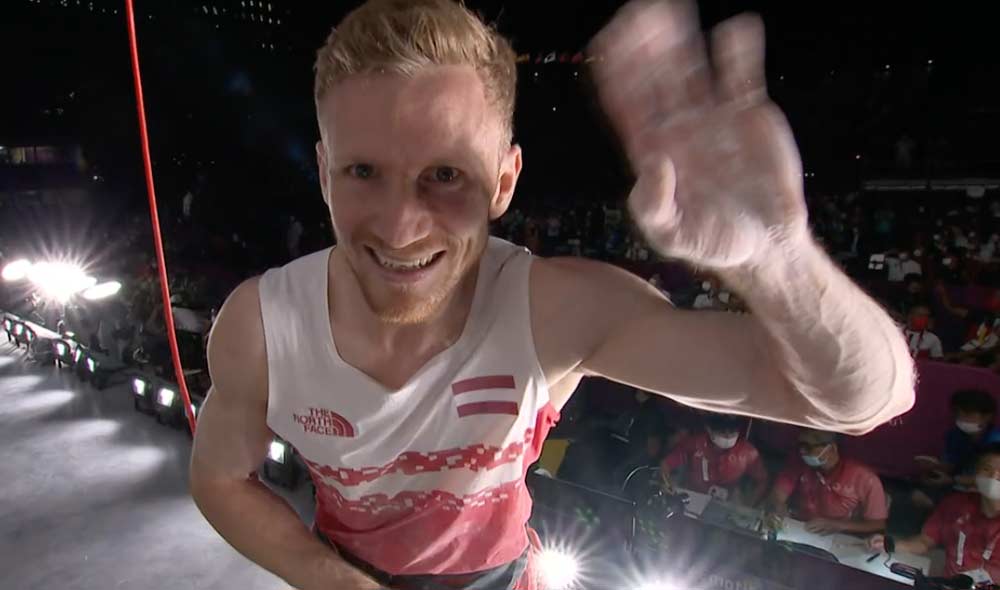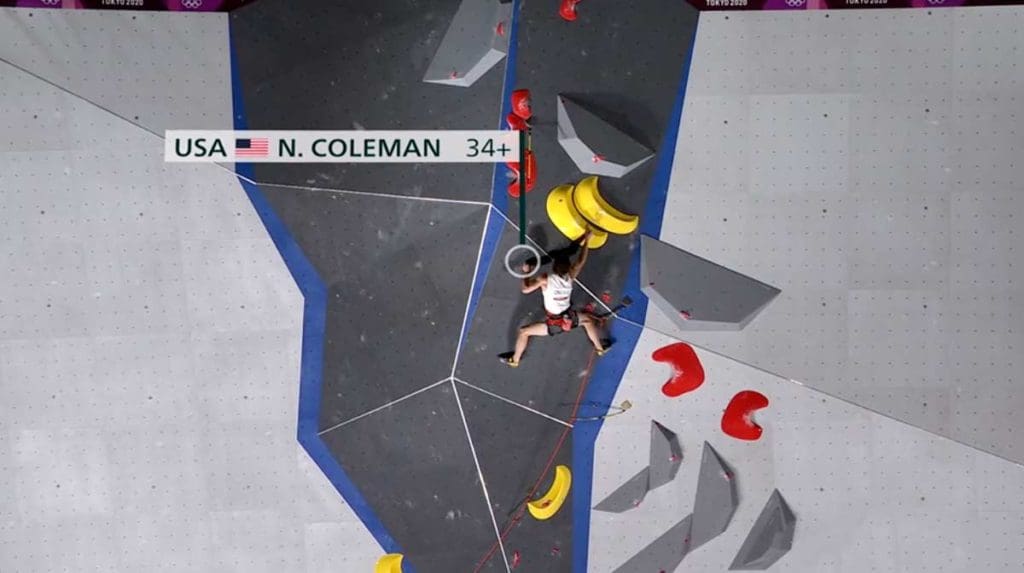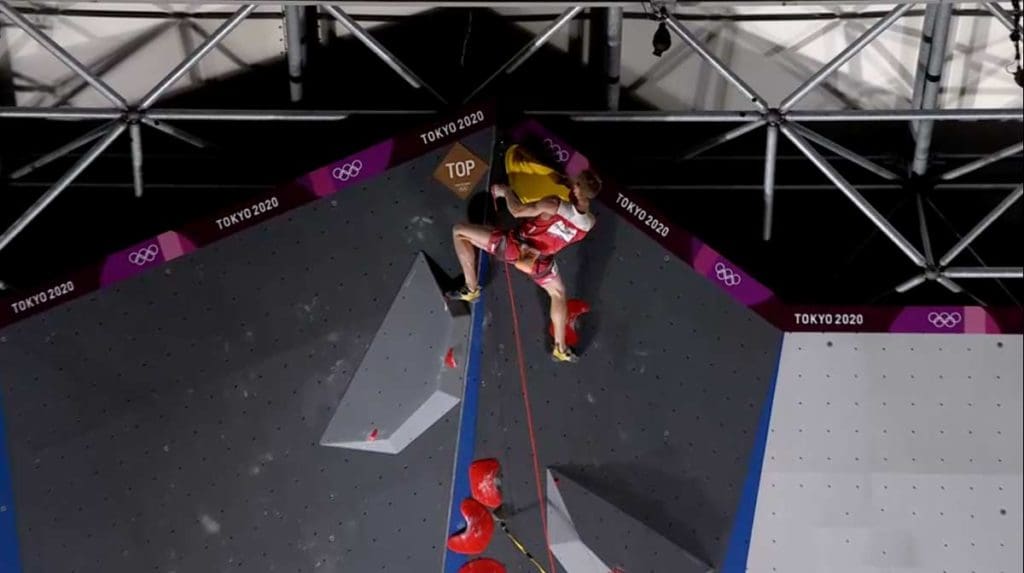The Spaniard Alberto Gines Lopez wins the first Olympic gold medal in the history of sport climbing. The American Nathaniel Coleman and the Austrian Jakob Schubert follow in second and third place. Crown favorite Adam Ondra finished in 6th place.
It was a final that couldn't be beat in terms of drama. Only after the last athlete on the lead wall was it clear who would get the medals. Because the Austrian Jakob Schubert caught up sensationally. He was the last athlete to win the only top and moved up from 7th place to bronze place. And that messed up the ranking with the combination calculation. Because with every competitor that Schubert climbed over, their multiplication factor in the lead changed to their disadvantage.
The big disadvantage was Adam Ondra, who lost the silver medal at the last moment.
Summa Summarum: Gines Lopez, Ondra and Coleman occupied the first three medal ranks before Schubert's march through, so it was said afterwards: Gines Lopez (1st), Coleman (2nd) and Schubert (3rd)

The big disadvantage was Adam Ondra, who lost the silver medal at the last moment. Had Schubert only climbed higher than Duffy, but not as Adam Ondra, Ondra would have become Olympic champion and Schubert would have finished last. His score would have doubled from 35 to 70 in one fell swoop, which would have catapulted him to the bottom of the ranking. But one after the other.
Narasaki breaks with expectations
The Japanese opened the race. After his performance in the qualification, you could be a little worried about him, because there he had seemed rather muddled and wasteful in his use of his strength - now again! First he chews freely hanging on one arm, then he needs several attempts again to clip. A little later he has to dynamically intercept a train because he leaves his feet unused. After handle 33 it is over.
The French Mickael Mawem follows, the speed and bouldering specialist retires earlier. A toehook slips off him - and he's gone before he can get into his all-out combat mode, a shame.
Nathaniel Coleman can then outbid the highpoint of Narasaki. The American is struggling with stamina soon, but can still shout astonishingly and with handle 34 manages one move more than Narasaki.
Adam Ondra meanwhile on course for medals
Then came the appearance of the lead king. Ondra's final performance was previously surprising in several ways. First of all, he surpassed himself in the speed competition, taking 4th place, although he is already safe because of Bassa Mawem's injury-related retirement. After all, Ondra shows himself to be a worthy owner of rank 4 - who would have thought that Ondra would spend 6.86 seconds on the speed wall? In the following bouldering competition, however, with a top and two zones, he fell short of expectations. In retrospect, one has to say: Here the Czech gambled away the medal.

And so it was clear that he could only fix it in the lead. He started like a high-speed steam locomotive. From the start he breathed audibly like a bull, but not because of exertion. Rather, it is a declaration of war. It's interesting that Ondra generally struggled with speed, but in the lead is always at an outstanding pace. It takes less than two minutes before he has already exceeded Coleman's high point and is still on the move as precisely as a machine.
It looks like a top, but handle 42 is over. Ondra is satisfied, 'more was not possible' - this is how his body language is to be interpreted on the way down. At this point, it looks like no one will dispute him for the medal.
The Czech gets going like a high-speed steam locomotive. It takes less than two minutes before he has already exceeded Coleman's highpoint.
It follows Alberto Gines Lopez, he climbs relatively dynamically from an early age - of course he is not the size of Ondra or Coleman. And yet one has the impression that it is also something to do with emerging tiredness. You have to consider: the program through which the athletes are chased here is brutal: speed, bouldering, lead - it all happens in quick succession (we already get into a lot of stress while taking notes).
The 18-year-old Spaniard is getting further than it initially appears. Step by step he can attach and falls just below the high point of Ondra. He has the medal for sure. And Ondra is starting to worry. Duffy and Schubert follow, both of whom could still oust him.
The incredible performance of Jakob Schubert
The young Colin Duffy - before the qualification still secret medal contender, became a hot favorite almost overnight - comes close to Ondra's Highpoint, but cannot place his foot optimally and falls out. While still on the rope, he throws his hands away; despite this top performance, it is not his day. Even more speed would have been possible, now probably too. If he had put his foot in the red shell, he would have come close to the top.
Known for the fact that he can fight to the bitter end, it just went up with the Austrian.
And then Schubert tackled the wall. For the Austrian: only 1st place can bring him forward. If he had achieved the sensational second lead rank behind Ondra, then he would have earned the multiplication factor 2 and with a total score of 70 would have been clearly last in the final round (7th place).
But what a strong nerve this man must have! Known for the fact that he can fight to the bitter end, it just went up with the Austrian. On the last few meters to the top, it even seemed to gain energy.

As Schubert gets closer to Ondra's Highpoint, the sheer madness and drama of this combined format reveals itself: Ondra is gold for a few seconds - namely at the moment when Schubert climbs Gines Lopez, but still remains below Ondra's highest mark. If the Austrian fell now, Ondra would be Olympic champion. But Schubert has other plans. A few seconds later, he clips the exe on the top, thus rewriting the history of the first sport climbing Olympic final.
The winner is moderately happy
No sooner was Schubert on the floor than the arithmetic started everywhere. At some point it was clear: Gines Lopez is the overall winner, followed by Coleman and Schubert. But at least at first glance, there can be no talk of unlimited joy with the Spaniard. He looked rather moderately amused behind his corona mask, Schubert almost had to cheer him up. The reason can only be one: Alberto Gines Lopez knows that he did not excel in the bouldering discipline without a single top.
He owes his gold medal largely to his speed victory. And this success was partly due to Bassa Mawem's injury. If the Frenchman hadn't been injured, Gines Lopez would have had to duel him in the speed semifinals instead of Ondra. His chances of reaching the final round would have been significantly lower against Mawem.
In any case, it looked as if Gines Lopez almost had a guilty conscience that he was now taking gold. It is now clear that this first Olympic climbing competition in this format will lead to strange results. That will be different for the next event in Paris. Speed is evaluated individually.
Summary of the events in the speed and bouldering finals
+ + +
Credits: Cover picture ARD


